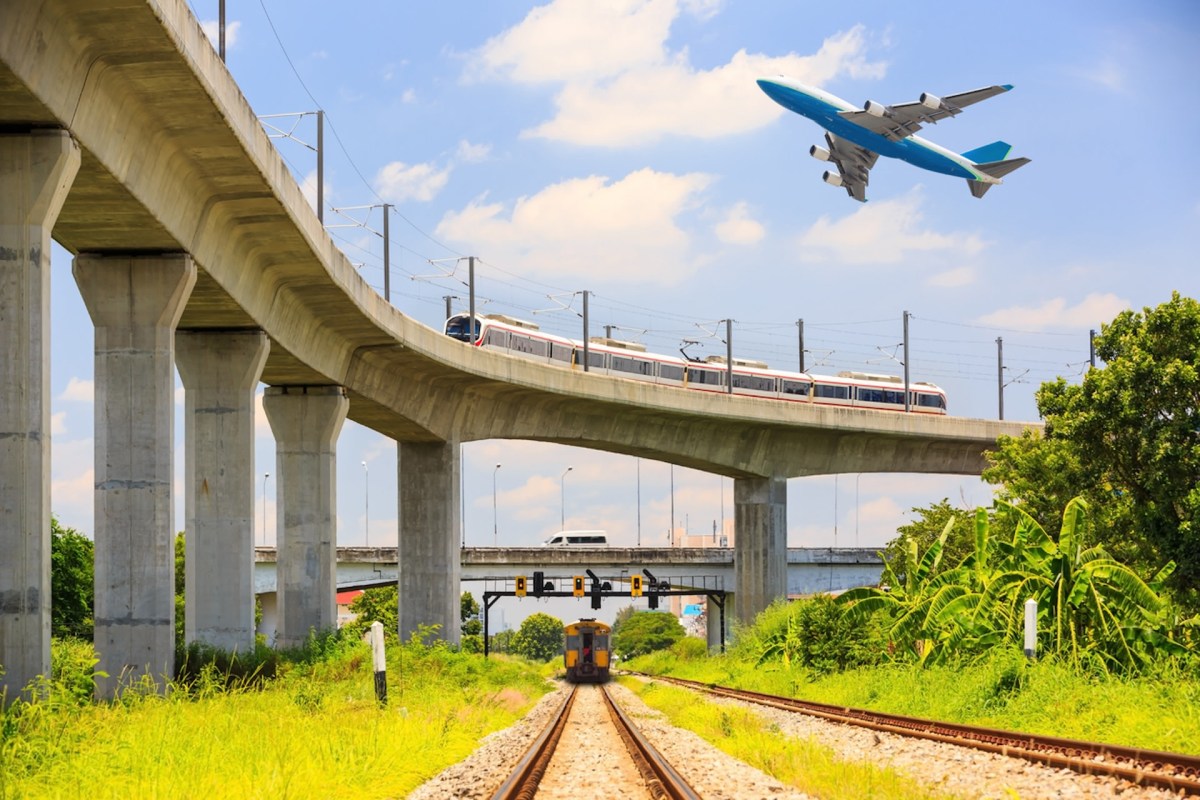The airplane versus train debate has landed on X.
On Dec. 27, an X user named Sam replied to a user named Daniel on a claim that airplanes are America's high-speed travel system. This assertion implies that the installation of a new high-speed rail system is redundant.
"America already has a 500 mph high speed rail system linking the country and it doesn't even take up any land and bugs way fewer people with noise," Daniel wrote on the platform formerly known as Twitter. "ITS CALLED A FREAKING AIRPLANE."
Sam countered that trains are more efficient than airplane flights over shorter distances because they save more space and have the capacity for more passengers. To demonstrate, he compared the size of the massive Dallas-Fort Worth Airport to the more compact Penn Station in New York City. (The airport covers a land area larger than Manhattan island's.)
"DFW airport takes up 70 square [kilometers, or about 27 square miles] of land and handles 72 million passengers a year," Sam wrote, in line with airport stats from 2022. "Penn Station takes up two square blocks and handles over 100 million passengers a year. You tell me which is more efficient."
High speed rail is superior for distances of under ~600 miles because
— sam (@sam_d_1995) December 27, 2023
1) stations can be located in the middle of a city and require much less land than an airport
2) no security, just show up a few minutes before your train
3) higher capacity
4) way fewer emissions
DFW airport takes up 70 square km of land and handles 72 million passengers a year
— sam (@sam_d_1995) December 27, 2023
Penn Station takes up two square blocks and handles over 100 million passengers a year
you tell me which is more efficient https://t.co/QOrTCShmpZ pic.twitter.com/UR9cDsBCQT
This exchange comes on the heels of President Biden's plans to invest $8.2 billion into "the first world-class high-speed rail projects in [America's] history."
These projects include new high-speed rail lines linking California to Nevada and Los Angeles to San Francisco, as well as upgrading and expanding capacity at the nation's busiest stations.
Sam's attention to airplanes' mismatch in footprint and ridership paints trains as vastly more efficient when it comes to transporting large numbers of people. Various sources note that swapping short flights for rail trips, in particular, could save huge amounts of jet fuel, which is highly toxic to humans and the environment and emits lead into the air, and would thus alleviate air pollution — not to mention noise pollution. Air travel has been found to emit around 100 times more carbon pollution per hour than trains or shared automobile transportation like buses. Avoiding airport sprawl also conserves undeveloped land.
However, airplanes do have their place and value in the world, and various replies noted the versatility of planes for long and overseas trips. "Can I get to Tokyo from Penn Station?" asked one user.
Additional reactions to the tweet debate recognize the merits of both sides but urge Sam to consider additional factors. "Since you're doing land area, you might also include the space for the tracks," one user added. "And you might also compare travel times."
Another said, "Texas [is] never running short on land. That airport created trillions in wealth for DFW metro."
Overall, the rational consensus was that air travel is not ideal for shorter distances that could be solved with improved train infrastructure to get travelers to their destinations faster and with less pollution, and the exchange sparked a productive discussion about greener travel.
Join our free newsletter for cool news and actionable info that makes it easy to help yourself while helping the planet.









